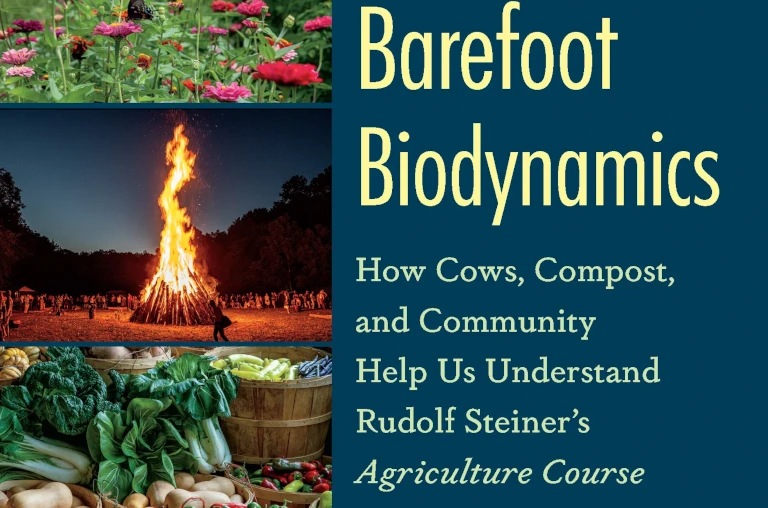 Ed. note: This piece is excerpted from Barefoot Biodynamics by Jeff Poppen and published by Chelsea Green Books. It is reposted here with permission.
Ed. note: This piece is excerpted from Barefoot Biodynamics by Jeff Poppen and published by Chelsea Green Books. It is reposted here with permission.
Barefoot in the title might seem misleading. The word doesn’t appear anywhere else in the book, but it implies my simple, down-to-earth approach. This book is about biodynamic gardening and farming and how I’ve made my livelihood since the mid-1970s. Cows, compost, and community are fundamental. A hundred years ago, and long before, farming was taught through experience and was more or less “organic.” As chemicals began to be used, a breath of common sense came through Rudolf Steiner’s lectures on agriculture in 1924, with his admonishment to avoid artificial fertilizers and rely on cows, compost, and traditional methods instead. The instinct of how to grow plants and animals lies dormant in us and can be inspired to awaken. The advice given in the course, which Steiner referred to as guiding lines, became the foundation for our farm, and is also the foundation of this book. Although Steiner’s esoteric ideas are fascinating, I’ve tried to keep this book easy to read. I’ll leave it to you to dig deeper into Steiner, biodynamics, and your garden. You can take your shoes off or not.
After returning home from delivering the agriculture course, Steiner gave a report to his colleagues about what happened. Lectures began at eleven in the morning and lasted until one in the afternoon, and were followed by a midday meal and roaming the grounds of the estate. About a hundred farmers and scientists attended. Afterward, they developed their farms and research from the guiding lines he gave.
With regard to the agriculture course, the first consideration was to outline what conditions are necessary in order for the various branches of agriculture to thrive. Agriculture includes some very interesting aspects—plant life, animal husbandry, forestry, gardening, and so on, but perhaps the most interesting of all are the secrets of manuring, which are very real and important mysteries . . . during the last few decades the agricultural products on which our life depends have degenerated extremely rapidly.*
In Steiner’s time, “manuring” meant how farmers fertilized the soil for growing crops. He was well aware of what was causing the degeneration of farm products. It was the new soluble artificial fertilizers. The secrets of manuring he refers to are the living interactions of microorganisms within the soil. The activity of bacteria, fungi, and other microbes in soil, compost, and manure are indeed real and important, but they were mysterious back then because so few people understood microbial interaction in the soil. Steiner understood, though, and could discern the detrimental effects of synthetic NPK (nitrogen/phosphorus/potassium) fertilizers on those microbes.
The importance of diverse, balanced microbial activities is now well established. We need our microbial partners in our stomachs and on our skin. Animals need them, plants need them, and so does the soil. Their presence in the soil helps ensure healthy plant growth. An immediate halt to chemical fertilizing and returning to the use of compost instead would turn degeneration into regeneration. Steiner understood the significance of manure, and how it should be handled. He grew up surrounded by farms that depended on manure to keep the fields fertile.
* This quotation is from the translation by Catherine E. Creeger and Malcolm Gardner published by the Bio-Dynamic Farming and Gardening Association, Inc., in 1993. All other Steiner quotations in this book are from the George Adams translation first published by Rudolf Steiner Press in 1958.





